- Home
- Elizabeth Gaskell
Wives and Daughters Page 8
Wives and Daughters Read online
Page 8
There was some bread, and some cold chicken, and some jelly, and a glass of wine, and a bottle of sparkling water, and a bunch of grapes. Molly put out her trembling little hand for the water; but she was too faint to hold it. Clare put it to her mouth, and she took a long draught and was refreshed. But she could not eat; she tried, but she could not; her headache was too bad. Clare looked bewildered. ‘Take some grapes, they will be the best for you; you must try and eat something, or I don’t know how I shall get you to the house.’
‘My head aches so,’ said Molly, lifting her heavy eyes wistfully.
‘Oh, dear, how tiresome!’ said Clare, still in her sweet gentle voice, not at all as if she was angry, only expressing an obvious truth. Molly felt very guilty and very unhappy. Clare went on, with a shade of asperity in her tone: ‘You see, I don’t know what to do with you here if you don’t eat enough to enable you to walk home. And I’ve been out for these three hours trapesing about the grounds till I’m as tired as can be, and missed my lunch and all.’ Then, as if a new idea had struck her, she said,—‘You lie back in that seat for a few minutes, and try to eat the bunch of grapes, and I’ll wait for you, and just be eating a mouthful meanwhile. You are sure you don’t want this chicken?’
Molly did as she was bid, and leant back, picking languidly at the grapes, and watching the good appetite with which the lady ate up the chicken and jelly, and drank the glass of wine. She was so pretty and so graceful in her deep mourning, that even her hurry in eating, as if she was afraid of some one coming to surprise her in the act, did not keep her little observer from admiring her in all she did.
‘And now, darling, are you ready to go?’ said she, when she had eaten up everything on the tray. ‘Oh, come; you have nearly finished your grapes; that’s a good girl. Now, if you will come with me to the side entrance, I will take you up to my own room, and you shall lie down on the bed for an hour or two; and if you have a good nap your headache will be quite gone.’
So they set off, Clare carrying the empty tray, rather to Molly’s shame; but the child had enough work to drag herself along, and was afraid of offering to do anything more. The ‘side entrance’ was a flight of steps leading up from a private flower-garden into a private matted hall, or ante-room, out of which many doors opened, and in which were deposited the light garden-tools and the bows and arrows of the young ladies of the house. Lady Cuxhaven must have seen their approach, for she met them in this hall as soon as they came in.
‘How is she now?’ she asked; then, glancing at the plates and glasses, she added, ‘Come, I think there can’t be much amiss! You’re a good old Clare, but you should have let one of the men fetch that tray in; life in such weather as this is trouble enough of itself.’
Molly could not help wishing that her pretty companion would have told Lady Cuxhaven that she herself had helped to finish up the ample luncheon; but no such idea seemed to come into her mind. She only said,—‘Poor dear! she is not quite the thing yet; has got a headache, she says. I am going to put her down on my bed, to see if she can get a little sleep.’
Molly saw Lady Cuxhaven say something in a half-laughing manner to ‘Clare,’ as she passed her; and the child could not keep from tormenting herself by fancying that the words spoken sounded wonderfully like ‘Over-eaten herself, I suspect.’ However, she felt too poorly to worry herself long; the little white bed in the cool and pretty room had too many attractions for her aching head. The muslin curtains flapped softly from time to time in the scented air that came through the open windows. Clare covered her up with a light shawl, and darkened the room. As she was going away, Molly roused herself to say, ‘Please, ma’am, don’t let them go away without me. Please ask somebody to waken me if I go to sleep. I am to go back with Miss Brownings.’
‘Don’t trouble yourself about it, dear; I’ll take care,’ said Clare, turning round at the door, and kissing her hand to little anxious Molly. And then she went away, and thought no more about it. The carriages came round at half-past four, hurried a little by Lady Cumnor, who had suddenly become tired of the business of entertaining, and annoyed at the repetition of indiscriminating admiration.
‘Why not have both carriages out, mamma, and get rid of them all at once?’ said Lady Cuxhaven. ‘This going by instalments is the most tiresome thing that could be imagined.’ So at last there had been a great hurry and an unmethodical way of packing off every one at once. Miss Browning had gone in the chariot (or ‘chawyot,’ as Lady Cumnor called it;—it rhymed to her daughter, Lady Hawyot—or Harriet, as the name was spelt in the Peerage), and Miss Phoebe had been speeded, along with several other guests, away in a great roomy family conveyance, of the kind which we should now call an ‘omnibus.’ Each thought that Molly Gibson was with the other, and the truth was, that she lay fast asleep on Mrs. Kirkpatrick’s bed—Mrs. Kirkpatrick, nee Clare.
The housemaids came in to arrange the room. Their talking aroused Molly, who sat up on the bed, and tried to push back the hair from her hot forehead, and to remember where she was. She dropped down on her feet by the side of the bed, to the astonishment of the women, and said,—‘Please, how soon are we going away?’
‘Bless us and save us! who’d ha’ thought of any one being in the bed? Are you one of the Hollingford ladies, my dear? They are all gone this hour or more!’
‘Oh, dear, what shall I do? That lady they call Clare promised to waken me in time. Papa will so wonder where I am, and I don’t know what Betty will say.’
The child began to cry, and the housemaids looked at each other in some dismay and much sympathy. Just then, they heard Mrs. Kirkpatrick’s step along the passages, approaching. She was singing some little Italian air in a low musical voice coming to her bedroom to dress for dinner. One housemaid said to the other, with a knowing look, ‘Best leave it to her;’ and they passed on to their work in the other rooms.
Mrs. Kirkpatrick opened the door, and stood aghast at the sight of Molly.
‘Why, I quite forgot you!’ she said at length. ‘Nay, don’t cry; you’ll make yourself not fit to be seen. Of course I must take the consequences of your over-sleeping yourself, and if I can’t manage to get you back to Hollingford to-night, you shall sleep with me, and we’ll do our best to send you home to-morrow morning.’
‘But papa!’ sobbed out Molly. ‘He always wants me to make tea for him; and I have no night-things.’
‘Well, don’t go and make a piece of work about what can’t be helped now. I’ll lend you night-things, and your papa must do without your making tea for him to-night. And another time don’t oversleep yourself in a strange house; you may not always find yourself amongst such hospitable people as they are here. Why now, if you don’t cry and make a figure of yourself, I’ll ask if you may come in to dessert with Master Smythe and the little ladies. You shall go into the nursery, and have some tea with them; and then you must come back here and brush your hair and make yourself tidy. I think it is a very fine thing for you to be stopping in such a grand house as this; many a little girl would like nothing better.’
During this speech she was arranging her toilette for dinner—taking off her black morning gown; putting on her dressing-gown; shaking her long soft auburn hair over her shoulders, and glancing about the room in search of various articles of her dress,—a running flow of easy talk came babbling out all the time.
‘I have a little girl of my own, dear! I don’t know what she would not give to be staying here at Lord Cumnor’s with me; but, instead of that, she has to spend her holidays at school; and yet you are looking as miserable as can be at the thought of stopping for just one night. I really have been as busy as can be with those tiresome—those good ladies, I mean, from Hollingford—and one can’t think of everything at a time.’
Molly—only child as she was—had stopped her tears at the mention of that little girl of Mrs. Kirkpatrick’s, and now she ventured to say,—
‘Are you married, ma’am; I thought she called you Clare?’
In high good-humour Mrs. Kirkpatrick made reply: ‘I don’t look as if I was married, do I? Every one is surprised. And yet I have been a widow for seven months now: and not a grey hair on my head, though Lady Cuxhaven, who is younger than I, has ever so many.’
‘Why do they call you “Clare”?’ continued Molly, finding her so affable and communicative.
‘Because I lived with them when I was Miss Clare. It is a pretty name, isn’t it? I married a Mr. Kirkpatrick; he was only a curate, poor fellow; but he was of a very good family, and if three of his relations had died without children I should have been a baronet’s wife. But Providence did not see fit to permit it; and we must always resign ourselves to what is decreed. Two of his cousins married, and had large families; and poor dear Kirkpatrick died, leaving me a widow.’
‘You have a little girl?’ asked Molly.
‘Yes: darling Cynthia! I wish you could see her; she is my only comfort now. If I have time I will show you her picture when we come up to bed; but I must go now. It does not do to keep Lady Cumnor waiting a moment, and she asked me to be down early, to help with some of the people in the house. Now I shall ring this bell, and when the housemaid comes, ask her to take you into the nursery, and to tell Lady Cuxhaven’s nurse who you are. And then you’ll have tea with the little ladies, and come in with them to dessert. There! I’m sorry you’ve overslept yourself, and are left here; but give me a kiss, and don’t cry—you really are rather a pretty child, though you’ve not got Cynthia’s colouring! Oh, Nanny, would you be so very kind as to take this young lady—(what’s your name, my dear? Gibson?),—Miss Gibson, to Mrs. Dyson, in the nursery, and ask her to allow her to drink tea with the young ladies there; and to send her in with them to dessert. I’ll explain it all to my lady.’
Nanny’s face brightened out of its gloom when she heard the name Gibson; and, having ascertained from Molly that she was ‘the doctor’s child,’ she showed more willingness to comply with Mrs. Kirkpatrick’s request than was usual with her.
Molly was an obliging girl, and fond of children; so, as long as she was in the nursery, she got on pretty well, being obedient to the wishes of the supreme power, and even very useful to Mrs. Dyson, by playing at tricks, and thus keeping a little one quiet while its brothers and sisters were being arrayed in gay attire,—lace and muslin, and velvet, and brilliant broad ribbons.
‘Now, miss,’ said Mrs. Dyson, when her own special charges were all ready, ‘what can I do for you?You have not got another frock here, have you?’ No, indeed, she had not; nor if she had had one, could it have been of a smarter nature than her present thick white dimity. So she could only wash her face and hands, and submit to the nurse’s brushing and perfuming her hair. She thought she would rather have stayed in the park all night long, and slept under the beautiful quiet cedar, than have to undergo the unknown ordeal of ‘going down to dessert,’ which was evidently regarded, both by children and nurses, as the event of the day. At length there was a summons from a footman, and Mrs. Dyson, in a rustling silk gown, marshalled her convoy, and set sail for the dining-room door.
There was a large party of gentlemen and ladies sitting round the decked table, in the brilliantly lighted room. Each dainty little child ran up to its mother, or aunt, or particular friend; but Molly had no one to go to.
‘Who is that tall girl in the thick white frock? Not one of the children of the house, I think?’
The lady addressed put up her glass, gazed at Molly, and dropped it in an instant. ‘A French girl, I should imagine. I know Lady Cuxhaven was inquiring for one to bring up with her little girls, that they might get a good accent early. Poor little woman, she looks wild and strange!’ And the speaker, who sat next to Lord Cumnor, made a little sign to Molly to come to her; Molly crept up to her as to the first shelter; but when the lady began talking to her in French, she blushed violently, and said in a very, low voice,—
‘I don’t understand French. I’m only Molly Gibson, ma’am.’
‘Molly Gibson!’ said the lady, out loud; as if that was not much of an explanation.
Lord Cumnor caught the words and the tone.
‘Oh, ho!’ said he. ‘Are you the little girl who has been sleeping in my bed?’
He imitated the deep voice of the fabulous bear, who asks this question of the little child in the story; but Molly had never read the ‘Three Bears,’2 and fancied that his anger was real; she trembled a little, and drew nearer to the kind lady who had beckoned her as to a refuge. Lord Cumnor was very fond of getting hold of what he fancied was a joke, and working his idea threadbare; so all the time the ladies were in the room he kept on his running fire at Molly, alluding to the Sleeping Beauty, the Seven Sleepers, and any other famous sleeper that came into his head. He had no idea of the misery his jokes were to the sensitive girl, who already thought herself a miserable sinner, for having slept on, when she ought to have been awake. If Molly had been in the habit of putting two and two together, she might have found an excuse for herself, by remembering that Mrs. Kirkpatrick had promised faithfully to awaken her in time; but all the girl thought of was, how little they wanted her in this grand house; how she must seem like a careless intruder who had no business there. Once or twice she wondered where her father was, and whether he was missing her; but the thought of the familiar happiness of home brought such a choking in her throat, that she felt she must not give way to it, for fear of bursting out crying; and she had instinct enough to feel that, as she was left at the Towers, the less trouble she gave, the more she kept herself out of observation, the better.
She followed the ladies out of the dining-room, almost hoping that no one would see her. But that was impossible, and she immediately became the subject of conversation between the awful Lady Cumnor and her kind neighbour at dinner.
‘Do you know, I thought this young lady was French when I first saw her? She has got the black hair and eyelashes, and grey eyes, and colourless complexion which one meets with in some parts of France, and I know Lady Cuxhaven was trying to find a well-educated girl who would be a pleasant companion to her children.’
‘No!’ said Lady Cumnor, looking very stern, as Molly thought. ‘She is the daughter of our medical man at Hollingford; she came with the school visitors this morning, and she was overcome by the heat and fell asleep in Clare’s room, and somehow managed to oversleep herself, and did not waken up till all the carriages were gone. We will send her home to-morrow morning, but for to-night she must stay here, and Clare is kind enough to say she may sleep with her.’
There was an implied blame running through this speech, that Molly felt like needle-points all over her. Lady Cuxhaven came up at this moment. Her tone was as deep, her manner of speaking as abrupt and authoritative, as her mother’s, but Molly felt the kinder nature underneath.
‘How are you now, my dear? You look better than you did under the cedar-tree. So you’re to stop here to-night? Clare, don’t you think we could find some of those books of engravings that would interest Miss Gibson?’
Mrs. Kirkpatrick came gliding up to the place where Molly stood; and began petting her with pretty words and actions, while Lady Cuxhaven turned over heavy volumes in search of one that might interest the girl.
‘Poor darling! I saw you come into the dining-room, looking so shy; and I wanted you to come near me, but I could not make a sign to you, because Lord Cuxhaven was speaking to me at the time, telling me about his travels. Ah, here is a nice book—Lodge’s Portraits;3 now I’ll sit by you and tell you who they all are, and all about them. Don’t trouble yourself any more, dear Lady Cuxhaven; I’ll take charge of her; pray leave her to me!’
Molly grew hotter and hotter as these last words met her ear. If they would only leave her alone, and not labour at being kind to her; would ‘not trouble themselves’ about her! These words of Mrs. Kirkpatrick’s seemed to quench the gratitude she was feeling to Lady Cuxhaven for looking for something to amuse her. But, of course, it was a trouble, and she ought never to have be
en there.
By and by, Mrs. Kirkpatrick was called away to accompany Lady Agnes’s song; and then Molly really had a few minutes’ enjoyment. She could look round the room, unobserved, and, sure, never was any place out of a king’s house so grand and magnificent. Large mirrors, velvet curtains, pictures in their gilded frames, a multitude of dazzling lights, decorated the vast saloon, and the floor was studded with groups of ladies and gentlemen, all dressed in gorgeous attire. Suddenly Molly bethought her of the children whom she had accompanied into the dining-room, and to whose ranks she had appeared to belong,—where were they? Gone to bed an hour before, at some quiet signal from their mother. Molly wondered if she might go too,—if she could ever find her way back to the haven of Mrs. Kirkpatrick’s bedroom. But she was at some distance from the door; a long way from Mrs. Kirkpatrick, to whom she felt herself to belong more than to any one else. Far, too, from Lady Cuxhaven, and the terrible Lady Cumnor, and her jocose and good-natured lord. So Molly sat on, turning over pictures which she did not see; her heart growing heavier and heavier in the desolation of all this grandeur. Presently a footman entered the room, and after a moment’s looking about him, he went up to Mrs. Kirkpatrick, where she sat at the piano, the centre of the musical portion of the company, ready to accompany any singer, and smiling pleasantly as she willingly acceded to all requests. She came now towards Molly, in her corner, and said to her,—
‘Do you know, darling, your papa has come for you, and brought your pony for you to ride home; so I shall lose my little bed-fellow, for I suppose you must go.’
Go! was there a question of it in Molly’s mind, as she stood up quivering, sparkling, almost crying out loud? She was brought to her senses, though, by Mrs. Kirkpatrick’s next words.
‘You must go and wish Lady Cumnor good night, you know, my dear, and thank her ladyship for her kindness to you. She is there, near that statue, talking to Mr. Courtenay.’
Yes! she was there—forty feet away—a hundred miles away! All that blank space had to be crossed; and then a speech to be made!

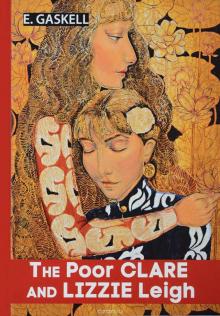 Lizzie Leigh
Lizzie Leigh The Poor Clare
The Poor Clare Lois the Witch
Lois the Witch North and South
North and South Sexton's Hero
Sexton's Hero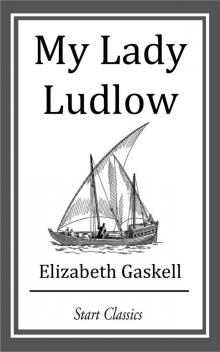 My Lady Ludlow
My Lady Ludlow Uncle Peter
Uncle Peter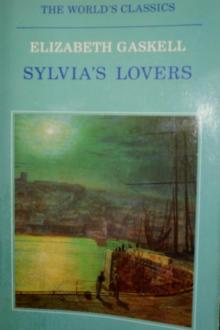 Sylvia's Lovers Elizabeth Cleghorn Gaskell
Sylvia's Lovers Elizabeth Cleghorn Gaskell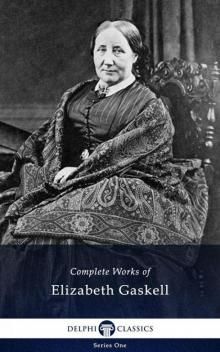 Delphi Complete Works of Elizabeth Gaskell
Delphi Complete Works of Elizabeth Gaskell The Grey Woman
The Grey Woman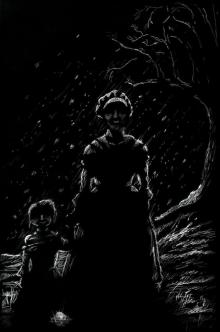 The Old Nurse's Story and Other Tales
The Old Nurse's Story and Other Tales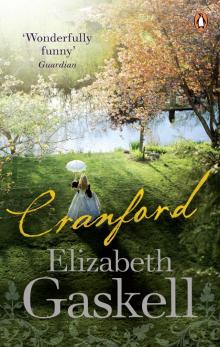 Cranford
Cranford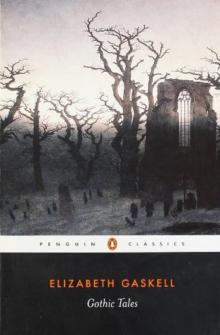 Gothic Tales
Gothic Tales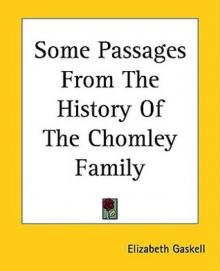 Some Passages From the History of the Chomley Family
Some Passages From the History of the Chomley Family An Accursed Race
An Accursed Race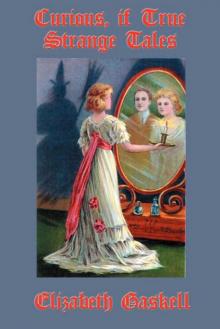 Curious, if True: Strange Tales Elizabeth Cleghorn Gaskell
Curious, if True: Strange Tales Elizabeth Cleghorn Gaskell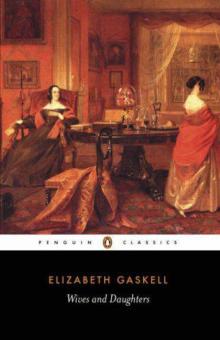 Wives and Daughters
Wives and Daughters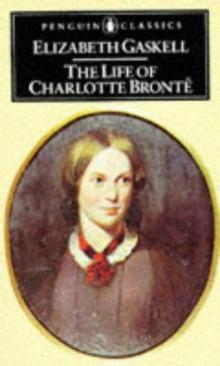 The life of Charlotte Brontë
The life of Charlotte Brontë